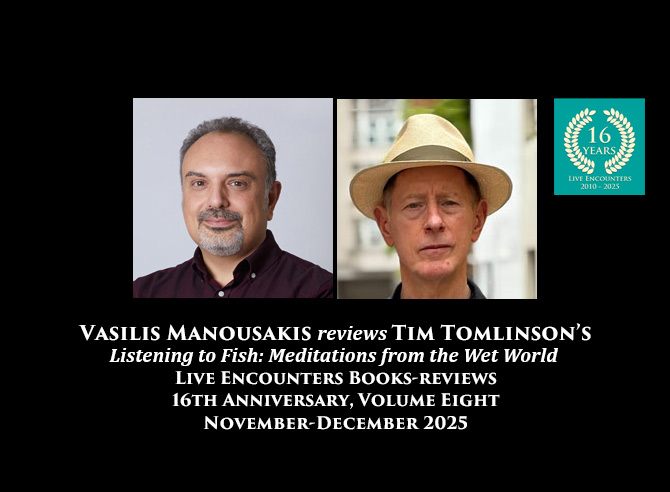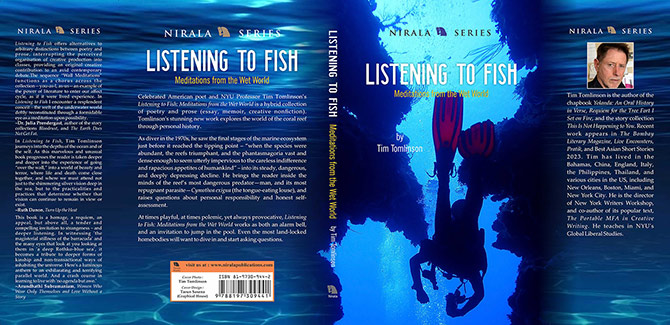
Live Encounters Books-Reviews Volume Seven
November- December 2025
Vasilis Manousakis Review of
Listening to Fish: Meditations from the Wet World by Tim Tomlinson.
Nirala Publications, 2025

Listening to Fish is a book of many tropes, just like it is a book about many species of fish, swimming in its pages. You browse through the pages and by appearance only, you see prose (“First Entries”) giving its place to abstract poetry (“Eagle Rays”, in the shape of the title fish) and abstract poetry to haiku (“Cora-ku: haiku of the coral reef”), and then the strict and traditional form of haiku makes way for the very modern list poem (“The Names: Places”). Among them, we encounter odes (“Ode to Miro & Rothko & Calder & the Coral Reef”), a villanelle (“Frogfish: A Vilanelle”), and repeated meditations (“Wall Meditations”). The reader changes scenery at every turn of the page and the reading of the book acquires the feel of a documentary about the deep. Because, above all, that is what the book is about: Tim Tomlinson’s diving experience and we follow him as he dives in the deepest thoughts, the highest philosophical musings and his ecological sensitivity. Indeed, as the poet states in his poem “No Philosophy”: “I have no philosophy except to save the fish / I have no theory except without fish, we’re dead.” He dives underwater to “help” the fish as the same poem concludes and we follow him in this effort to care and fight to save them.
Listening to Fish is not a call-to-action book, though. We might end up caring and actually participating in Tomlinson’s endeavors, but while reading it, we feel no pressure. Instead, we feel the quietness of the ocean, and we start seeing the fish -the words- swimming around us, calling us to think of our place on this planet. Tomlinson’s mastery of words and change of tone and pace present us with the opportunity to follow our own way in reading his book. One can follow the prosaic “Wall Meditations #1-6” or “Tank Fill 1-5” or “Emergency file #1-7”, where Tomlinson states his opinions, or one can focus only on poetry and see the colorful and multi-dimensional portrait of the ocean, the poet paints. Whichever way one chooses to read this book, there is one certainty: we will not get lost with Tomlinson as our guide. At the core of the book lies the belief, shared by the poet, that the responsibility lies on us to act against the extinction of what holds us together and alive. The coral reef becomes a metaphor for both the abundance and the beauty we can experience, and the self-destructive tendency of modern man.
One of the most beautiful poems in Listening to Fish is “Legitimate Questions We Might Put to a Garden Eel” where Tomlinson composes a poem out of questions only. This poem, in my opinion, epitomizes the philosophy of the book and is like a window to the poet’s mind. The garden eel, as the scientific information at the beginning of the poem tells us, is a very shy creature hiding in holes. And Tomlinson asks:
“Have you ever been touched?”
“Have you ever wanted to be touched?”
“Did something happen that made you fear touching?”
It is as if the diver is in therapy exploring his own trauma, being asked questions about trust. Questions that are included as the poem continues:
“Do you believe things that do bad things can change?”
“If I said, I’ve done bad things but I’ve changed, would you trust me?”
“Would you believe me if I told you that I’ve been hurt, too, but that I learned to trust, that I had to learn to trust?”
And the questions continue until the end of the poem, urging us to identify and self-reflect.
“Anyone ever tell you how beautiful you are?”, Tomlinson concludes, and it is exactly this compassionate and empathetic stance of the whole book that makes it a great read. Fish are viewed with kindness and positivity. And so are people in the poet’s worldview.
“They’re coming again, the fish. Night after night.” We should listen.
© Vasilis Manousakis
Vasilis Manousakis is a university professor, mental health counselor, writer, and translator, whose work has appeared in New American Writing, Hayden’s Ferry Review, Barcelona Ink, Parentheses and Drunken Boat among others. He is the author of six books, and his latest is Tango in Blue Nights (Liotrivi pubs, 2025). He holds a Ph.D. in Contemporary American Poetry and currently teaches Creative Writing, Language and Culture at the University of Patras, western Greece. At the same time, he is a faculty member of the New York Writers Workshop and has organized their annual symposium in Athens, Greece in May-June 2022 and 2025. He is also a part-time faculty member of the American College of Greece, where he teaches Creative Writing. He writes reviews and translates poetry and short stories for literary magazines and e-zines. His focus on human thought and behavior in his teaching and his writings has led him to Mental Health Counselling and he holds individual and group sessions with clients, specializing in Cognitive Behavioral Therapy, Couples Therapy and Mentoring for teenagers and young adults. Finally, he volunteers in prisons and teaches Creative Writing to inmates.
Tim Tomlinson is the author, most recently, of Listening to Fish: Meditations from the Wet World, a poetry-prose–photo hybrid concerning the splendors of, and the perils facing, the world’s coral reefs. He is also the author of This Is Not Happening to You (fiction), Requiem for the Tree Fort I Set on Fire (poetry), and Yolanda: An Oral History in Verse. He co-authored The Portable MFA in Creative Writing by New York Writers Workshop, of which he is the director. He teaches in New York University’s Global Liberal Studies.

